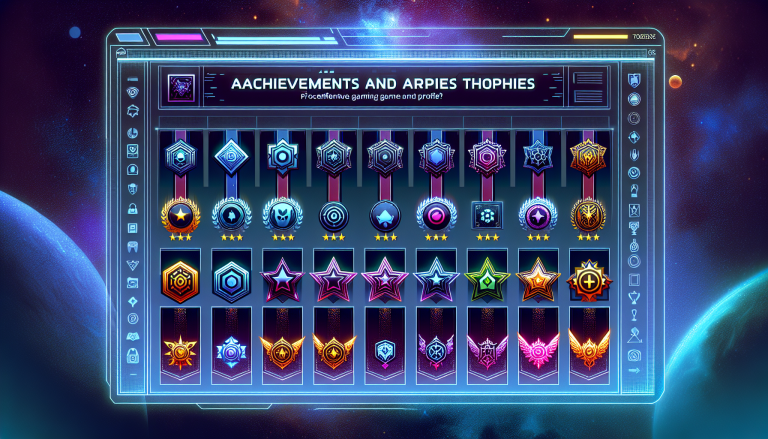The Evolution of Video Game Journalism: From Hobbyist Reviews to Professional Analysis
Hey there, fellow gamers! Today, let’s dive into the fascinating world of video game journalism and explore how it has evolved over the years. From humble beginnings as hobbyist reviews to the emergence of professional analysis, video game journalism has come a long way.
Back in the early days of video games, enthusiasts would gather in small forums and share their thoughts and opinions on the latest releases. These early reviews were often subjective and lacked the depth and analysis we see today. However, they played a crucial role in establishing a sense of community and sharing valuable insights with fellow gamers.
As the gaming industry grew and games became more complex, the need for more professional and in-depth coverage arose. Enter the era of professional video game journalism. With the rise of dedicated gaming magazines and websites, gamers were introduced to a whole new level of analysis and reporting.
In this new era, video game journalists began to provide critical evaluations of games, analyzing their mechanics, storytelling, graphics, and overall experience. They also started conducting interviews with game developers, gaining insights into the creative process behind these virtual worlds we love so much.
This shift towards professional analysis brought about a higher level of credibility and objectivity to video game journalism. Gamers started to rely on these experts’ opinions to make informed purchasing decisions. After all, who wants to spend their hard-earned money on a game that turns out to be a disappointment?
Nowadays, video game journalism has become an integral part of the gaming industry. Major gaming publications, online platforms, and even dedicated YouTube channels provide a wealth of information and entertainment for gamers worldwide.
However, with this professionalization of video game journalism also comes a set of ethical challenges. Journalists must strike a delicate balance between providing objective analysis and appeasing commercial interests. Game publishers often provide review copies to journalists, and while this can be helpful for timely coverage, it can also potentially compromise the reviewer’s objectivity.
To maintain credibility, video game journalists must always be transparent about any potential conflicts of interest and strive for honesty and integrity in their reporting. Being upfront with their audience about any sponsorships or promotional partnerships ensures that their opinions and recommendations are unbiased.
Looking to the future, video game journalism will undoubtedly continue to evolve alongside advancements in technology and the ever-changing landscape of the gaming industry. Virtual reality, augmented reality, and cloud gaming are just a few examples of the exciting developments that will shape the future of gaming and, subsequently, video game journalism.
So, as avid gamers, let’s appreciate the journey video game journalism has taken. From its humble beginnings as hobbyist reviews to the professional analysis we rely on today, it has played a vital role in shaping our gaming experiences. Stay tuned for more exciting updates and insightful analysis from the world of video game journalism!
The Influence of Video Game Journalism on Audience Perceptions and Purchasing Decisions
Video game journalism has come a long way since its humble beginnings. Gone are the days of hobbyist reviews written for niche gaming magazines. Today, video game journalism has evolved into a professional and influential industry that plays a significant role in shaping audience perceptions and purchasing decisions.
When it comes to video game journalism, the power of influence cannot be underestimated. Modern video game journalists have a massive responsibility as they provide insights, analysis, and reviews that help gamers make informed decisions about their purchases. Their opinions can sway the masses and have a direct impact on the success or failure of a game.
One major way in which video game journalism influences audience perceptions is through game reviews. A positive review can generate buzz and excitement, leading to increased interest and sales. On the other hand, a negative review can steer potential buyers away from a game, resulting in poor sales and reception.
While some may argue that reviews are subjective and based on personal opinions, they still hold considerable weight in the gaming community. Gamers often look to trusted sources for guidance, relying on the expertise and experience of journalists to help them make informed choices. Therefore, it is crucial for video game journalists to approach their reviews with objectivity and fairness, considering various aspects such as gameplay mechanics, graphics, storytelling, and overall enjoyment.
Video game journalism also influences purchasing decisions through the coverage of industry events and announcements. Journalists attend major gaming conventions and conferences, providing firsthand accounts and coverage of new game releases, trailers, and updates. This coverage can create hype and anticipation for upcoming titles, driving gamers to pre-order or purchase the games as soon as they become available.
However, with great influence comes ethical challenges. Video game journalists must navigate the fine line between objectivity and commercial interests. The gaming industry is a billion-dollar business, with publishers and developers often seeking favorable coverage for their products. This can create conflicts of interest and compromise the integrity of journalism.
To maintain credibility, video game journalists must strive to remain independent and transparent. Disclosing any potential conflicts of interest, such as receiving free review copies or attending sponsored events, is essential to maintain trust with the audience. By being honest and upfront about any potential biases, journalists can ensure that their audience knows they are getting an objective and unbiased perspective.
The future of video game journalism lies in navigating the digital age and technological advancements. With the rise of online platforms, streaming, and social media, journalists must adapt to new mediums and find ways to engage with their audience. Video content, live streams, and interactive discussions are becoming increasingly popular, offering new and exciting ways to deliver gaming news and analysis.
As video game journalism continues to evolve, it is essential for journalists to remember the impact they have on audience perceptions and purchasing decisions. By providing objective and insightful analysis, they can help gamers make informed choices and contribute to the growth and development of the gaming industry as a whole.
3. Ethical Challenges in Video Game Journalism: Balancing Objectivity and Commercial Interests
Gaming journalism has come a long way since its early days as hobbyist reviews. With the rise of professional analysis and the growing influence of video game journalism, there are several ethical challenges that journalists in this field must navigate. One of the biggest challenges is striking a balance between objectivity and commercial interests.
When it comes to reviewing video games, it can be difficult to separate personal preferences from objective analysis. Every journalist has their own tastes and biases, and it’s important to be aware of these and try to minimize their impact on reviews. While it’s natural for journalists to have their own opinions, it’s essential to approach reviews with an open mind and consider the broader audience.
Another aspect of ethical challenges in video game journalism is the influence of commercial interests. Video game journalism often operates within a larger industry that includes game developers, publishers, and advertisers. This can create potential conflicts of interest, as journalists may feel pressure to promote certain games or products in exchange for financial gain or other perks.
To maintain ethical standards, video game journalists must prioritize their audience’s interests above any commercial incentives. This means being transparent about any potential conflicts of interest and clearly disclosing any financial relationships or sponsored content. Journalists should also strive to provide honest and unbiased analysis, even if it may go against the interests of game developers or publishers.
One way to navigate the ethical challenges in video game journalism is by establishing a code of ethics. This code can outline the principles and guidelines that journalists should follow to ensure ethical conduct. For example, journalists can commit to disclosing any conflicts of interest, avoiding the acceptance of gifts or favors that may compromise their objectivity, and providing fair and balanced coverage of games.
In addition to establishing a code of ethics, video game journalists should also seek to build trust with their audience. Trust is vital in journalism, and it’s no different in the world of video game journalism. By consistently providing accurate, unbiased, and insightful analysis, journalists can earn the trust of their readers and viewers.
As a video game journalist, it’s important to remember that your primary responsibility is to your audience. While commercial interests may tempt you, it’s crucial to prioritize the interests of your readers or viewers. By maintaining objectivity, disclosing any potential conflicts of interest, and providing honest analysis, you can contribute to the integrity of video game journalism.
The Future of Video Game Journalism: Navigating the Digital Age and Technological Advancements
Hey there, fellow gamers! Have you ever wondered what the future holds for video game journalism? Well, buckle up because we’re about to dive into the exciting world of the digital age and technological advancements that are shaping the future of this ever-evolving field.
A Brave New World of Gaming
With the rapid advancements in technology, the world of gaming is constantly evolving. From the advent of virtual reality to the rise of mobile gaming, there’s no denying that the way we play and experience games is changing. And with these changes come new opportunities and challenges for video game journalists.
As technology continues to advance, video game journalists must adapt and embrace new platforms and mediums for sharing their insights. Online platforms and social media have already become crucial spaces for game reviews, news, and discussions. To stay relevant, journalists must navigate this digital landscape and find innovative ways to engage with their audience.
The Rise of Influencers and Streamers
In recent years, we’ve witnessed the rise of gaming influencers and streamers who have amassed massive followings. These personalities have become influential voices in the gaming community, and their opinions hold weight when it comes to shaping audience perceptions and purchasing decisions.
Video game journalists need to understand the impact of these influencers and streamers on the industry. By collaborating with them or leveraging their insights, journalists can provide a more comprehensive analysis of games and connect with a broader audience. Building strong relationships with influencers can be a win-win situation as it allows both parties to benefit from each other’s expertise and reach.
The Importance of Authenticity and Trust
While navigating the digital age, video game journalists should always prioritize authenticity and trust. With the rise of fake news and clickbait, it’s crucial for journalists to maintain their integrity and provide accurate and unbiased information to their audience.
Building trust with readers is essential, and journalists can achieve this by being transparent about their sources, disclosing any potential conflicts of interest, and delivering well-researched and thoughtful analysis. In a world filled with noise and misinformation, gamers crave reliable and trustworthy sources of information.
Adapting to New Technologies
The future of video game journalism will undoubtedly be shaped by new technologies such as artificial intelligence and virtual reality. These advancements have the potential to revolutionize not only the way games are played but also how they are covered by journalists.
Imagine a future where AI-powered algorithms can analyze games and provide detailed insights for journalists to incorporate into their reviews. Virtual reality could also allow journalists to immerse themselves in the game world, giving readers a more vivid and experiential understanding of the gameplay.
Embracing these new technologies will be crucial for video game journalists to stay ahead of the curve and provide readers with cutting-edge analysis and coverage.
In Conclusion
The future of video game journalism is bright and filled with exciting possibilities. As technology continues to advance, journalists must adapt, embrace new platforms and mediums, and maintain their authenticity and trustworthiness. By staying informed about the latest trends and technologies, journalists can provide insightful analysis and become trusted voices in the gaming community.












